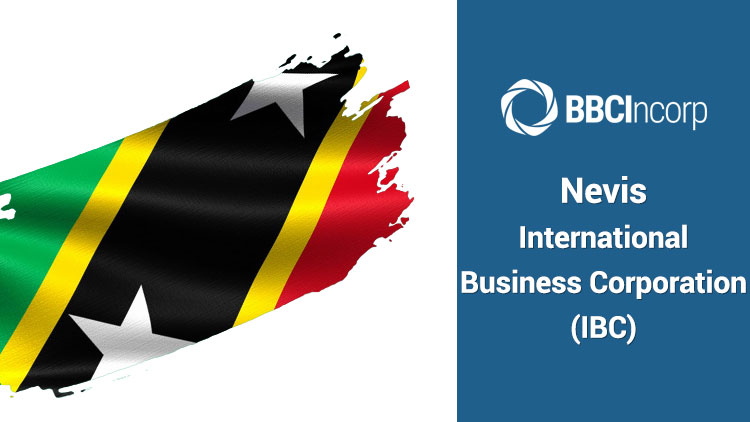
With plenty of benefits, more entrepreneurs are seeking the opportunities for their businesses in offshore jurisdictions – the places where they can register a business but perform the operations across the borders.
Nevis, which is a small island comprising the Federation of St Kitts and Nevis in the Caribbean, has great competitive advantages for offshore businesses. In addition to Nevis Limited Liability Company (LLC), Nevis International Business Corporation (IBC) is the most popular legal form in the country. Let’s discover the business entity in more detail with BBCIncorp.
1. Definition and key features of Nevis IBC
For many entrepreneurs, especially the newbies, the term Nevis IBC may cause confusion. Nevis IBC, or Nevis International Business Corporation, is an offshore company which is formed under Nevis’s laws but conducts business in other countries.

KEY FEATURES
Corporate legislation. The legal system of Nevis is based on English Common Law. Nevis IBCs are formed under Nevis Business Corporation Ordinance of 1984 (NBCO) with some amendments in later years.
Corporate structure. Under the Ordinance, Nevis IBC formation requires at least one shareholder and one director. Moreover, a shareholder can be a natural person or a company or an organization.
Types of shares. Nevis IBC can own registered shares and bearer shares. Bearer shares are only permitted with the approval of the Registrar of Corporations or the Regulator.
NOTE
Registered shares are shares which are registered and can be tracked to the share owners with their names and other details.
Bearer shares are not registered and must be held in safe custody by an approved trustee. The information of share ownership is not specified, so they are used to protect assets in some situations such as bankruptcy.
Trading restrictions. A Nevis offshore company is not allowed to do real estate business within the territory of the country. Conducting banking or insurance business in the country requires business licenses and the approval from the government.
2. Main advantages and disadvantages of Nevis IBC

Being well-known as an offshore jurisdiction, Nevis has become a hotspot for many business incorporators all over the world. There are multiple reasons why many entrepreneurs opt for Nevis IBC formation.
Favorable tax treatments. Taxation is always the most concerning topic for offshore business owners. Nevis taxation is one of the top factors attracting a significant number of entrepreneurs opting for business incorporation in the country. Below are preferential tax policies that a company can enjoy as a registered IBC in Nevis:
- No corporate tax for income sourced out of the border;
- No estate, inheritance, gift, duty, capital gains taxes, withholding tax, stamp tax, asset tax, or other taxes and fees levied on assets and income generated beyond St Kitts and Nevis.
The flexibility of shareholders, officers and directors. There is no residency requirement for shareholders, officers and directors of a Nevis IBC. They can reside outside the country and participate in corporate meetings using online platforms. They can also be individuals or any business entities. Moreover, there is no limitation of corporate ownership.
No exchange control. To encourage more foreign businesses registered in the country, Nevis applies no exchange control on IBCs. So your company can use and exchange any currency at your convenience. Besides, the authorized share capital can be performed in any recognized currency.
High layer of corporate anonymity. Nevis legislation allows the company registered within the border to use nominee directors and shareholders. Therefore, the information of the company’s members and shareholders will be kept confidential. The information just needs to be provided internally or by court order.
Less maintenance requirements. There is no need to file corporate financial reports or audits. Corporate and accounting records just need to be submitted to the registered agent or tax authorities. Still, an annual renewal fee must be paid from the second year of corporate registration to maintain the company’s legal existence.
Remote access. With support from authorized registered agents or service providers, business procedures and affairs can be processed remotely such as company registration, bank account opening, contract signing, investing.
Besides many benefits provided by Nevis IBC, there is one disadvantage of this legal entity is that the company is not allowed to operate business in some specific fields.
3. How to register a Nevis IBC

Forming a Nevis IBC requires business owners to file the Articles of Incorporation to the Registrar of Corporations. There are four main steps to register a Nevis IBC.
Step 1: Identifying a registered agent
Under the Ordinance, the incorporators must appoint and maintain a registered agent to work on behalf of the company to receive legal papers and notices from the Registrar of Corporations. Below are factors to determine a qualified registered agent:
- Maintaining a physical registered office Saint Kitts and Nevis;
- Being a barrister or solicitor admitted to practice in the country;
- Being licensed by the Minister.
The Registrar of Corporations can act as a registered agent if your company fails to maintain an authorized agent in Nevis.
Step 2: Selecting corporate name
It is required for business incorporators to choose a corporate name complying with Nevis law. The selected name shall:
- Being the unique name in the company register;
- Including the word “corporation”, “incorporated”, “limited” or their abbreviations, or other words that distinguish the corporation from a natural person or partnership.
You can always check if your desired corporate name is available or not here. The corporate name can be reserved to avoid being taken by other business incorporators.
Step 3: Filing the Articles of Incorporation
The Articles of Incorporation acts as a proof of your company’s existence in the Registrar of Corporations. Below are required information for the articles:
- The name of the corporation;
- A statement that the company is registered under the Ordinance;
- The corporate purpose;
- The company address which shall be the address of the registered agent;
- The number of registered shares to be authorized and shares to be issued;
- The number of bearer shares, if any;
- Names and addresses of the initial directors who serve the company until the first annual corporate meeting;
- The name and address of each incorporator.
The Articles of Incorporations must be signed by the incorporators – who work on behalf the company to do the filing.
Step 4: Holding organization meeting and adopting bylaws
The corporate meeting will be held by the initial directors or the incorporators to adopt bylaws, appoint officers. There may be the appointment of the directors if the initial ones are not listed in the Articles of Incorporation.
All corporations formed under the Ordinance are required to have bylaws. The bylaws can be included in the Articles of Incorporation. If not, it can be adopted by the initial board of directors or shareholders. Later amendments will be processed via voting between shareholders.
Bylaws contain all information relating to the corporation and its business affairs such as the company details, the information of directors, shareholders and officers, rights and obligations of members and company regulations.

Other considerations
Business licenses and permits. Specific businesses are required to obtain business licenses and permits to lawfully register their businesses in Nevis. You should contact departments which are responsible for issuing licenses and permits to know if your businesses must apply for licensed registration.
Bank account opening. A bank account is not mandatory for Nevis IBC but you can’t track and manage your corporate business finances without it. It is very difficult for foreign entrepreneurs to get a business bank account opened because a lot of paperwork and a personal visit may be required. You need support from the professionals who are experienced in this matter to avoid arising problems.
Annual shareholder meeting. Every year, a shareholder meeting will be held to elect a new board of directors. The meeting will be designated in the bylaws. All activities and resolutions made by shareholders are recorded in meeting minutes.


.webp)



0 Comments